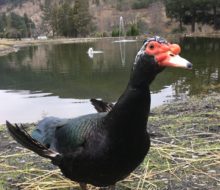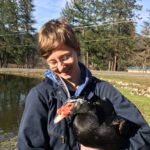Meet one of our newest residents, Howard the duck! He comes to us from Wildlife Images. Although he is a domestic duck, (a Muscovy or Muscovy mix), they loved him there and liked the opportunity to educate the public about “Angel Wing” in waterfowl. But ultimately they realized he needed to go where he wouldn’t pester the other wild birds in his enclosure. Now he is happy as can be in our pond pasture and enjoys swimming, socializing with us, swimming, hanging out with our farm animals, and swimming some more. He is a fun, fantastic duck!
“Angel Wing” is a condition that some birds get when they are fed an improper diet during their development. You will often see ducks and geese with this affliction at parks where well-meaning, but ill-informed people feed them unhealthy bird food like bread and crackers. It is incurable in adults and renders them flightless.
It is important to recognize that regular feeding of waterfowl can lead to disease, over population, and aggressive behavior. This isn’t to say people should never feed wild birds (although reasonably Audubon Societies encourage not feeding wild waterfowl); rather, it is a call to action to educate ourselves and others on what is healthy food for waterfowl and to consider how often we feed them, if at all. Feeding waterfowl can be one route to help youth connect to the nature in their community. We must do so mindfully though, and use the opportunity to help wild animals as a chance to educate, as well as to connect to nature.
While we strive to limit overfeeding wildlife populations, if we do feed them, we can choose healthy options. The best option is to purchase waterfowl specific food from local feed stores. You can toss some in a small reusable bag and carry it with you on hikes or walks around lakes. Other treats that are safe and nutritious for waterfowl are seedless grapes cut in half (you want to avoid whole grapes as they are a choking hazard), or cracked corn. If you live near water, a great option is to ensure you have waterfowl friendly plants growing on your land, which could provide both shelter and food.
Howard was lucky Wildlife Images was able to take him to help, and we are so pleased he was able to join our Sanctuary One family as we help him find his forever home. If interested in adopting Howard, an unusually beautiful and friendly duck, fill out our adoption application available on our website, and check out our adoptable friends.



